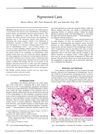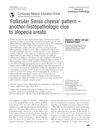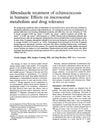TLDR A woman experienced rapid hair loss after taking albendazole, but it started to improve when she stopped the medication.
The document reports a case of a 74-year-old woman who experienced rapid-onset, acute hair loss on her scalp and body, including eyebrows, chin, extremities, and genitalia, two weeks after completing a 5-day course of albendazole (400 mg every 12 hours) for Toxocara antibodies. She had no prior history of hair loss. Examination and histopathology supported a diagnosis of anagen effluvium, a nonscarring alopecia that occurs after a toxic or inflammatory insult and is generally reversible upon discontinuation of the offending agent. The patient showed mild improvement of hair regrowth one month after initial presentation, despite being lost to follow-up. The case emphasizes that although albendazole has a relatively benign side-effect profile, it can rarely cause anagen effluvium, which is generally reversible with the cessation of the drug.
 16 citations
,
July 2013 in “The American Journal of Dermatopathology”
16 citations
,
July 2013 in “The American Journal of Dermatopathology” Pigmented casts are common in several hair loss conditions and can help diagnose specific types of alopecia.
 5 citations
,
March 2012 in “Clinical and Experimental Dermatology”
5 citations
,
March 2012 in “Clinical and Experimental Dermatology” A woman experienced temporary hair loss after taking albendazole, which resolved on its own within 3 months.
 35 citations
,
November 2010 in “Journal of Cutaneous Pathology”
35 citations
,
November 2010 in “Journal of Cutaneous Pathology” Dilated follicular infundibula and increased catagen/telogen follicles are key indicators for diagnosing alopecia areata.
 144 citations
,
July 2002 in “Clinical and Experimental Dermatology”
144 citations
,
July 2002 in “Clinical and Experimental Dermatology” Telogen effluvium is a common type of hair loss that can resolve on its own or become chronic, with treatment depending on early diagnosis.
 126 citations
,
January 2001 in “World Journal of Surgery”
126 citations
,
January 2001 in “World Journal of Surgery” Surgery is the main treatment for liver hydatidosis, but has risks; albendazole is the most effective drug but can have side effects.
 64 citations
,
July 1997 in “Journal of The American Academy of Dermatology”
64 citations
,
July 1997 in “Journal of The American Academy of Dermatology” Finding eosinophils near hair bulbs helps diagnose alopecia areata.
 61 citations
,
March 1990 in “Clinical pharmacology and therapeutics/Clinical pharmacology & therapeutics”
61 citations
,
March 1990 in “Clinical pharmacology and therapeutics/Clinical pharmacology & therapeutics” Albendazole treatment for echinococcosis can cause serious side effects and requires close monitoring.
 63 citations
,
March 1995 in “International Journal of Dermatology”
63 citations
,
March 1995 in “International Journal of Dermatology” Some drugs can cause hair loss, and stopping these drugs often leads to hair regrowth.
 8 citations
,
November 1990 in “International Journal of Dermatology”
8 citations
,
November 1990 in “International Journal of Dermatology” Albendazole may cause hair loss.
 November 2019 in “Harper's Textbook of Pediatric Dermatology”
November 2019 in “Harper's Textbook of Pediatric Dermatology” The document is a detailed medical reference on skin and genetic disorders.
 January 2022 in “Dermatology Review”
January 2022 in “Dermatology Review” Higher IL-31 levels are linked to worse itching in chronic kidney disease patients.
 83 citations
,
May 1999 in “International Journal of Dermatology”
83 citations
,
May 1999 in “International Journal of Dermatology” Hair loss that spreads out can often fix itself or be treated by finding and handling the cause.












